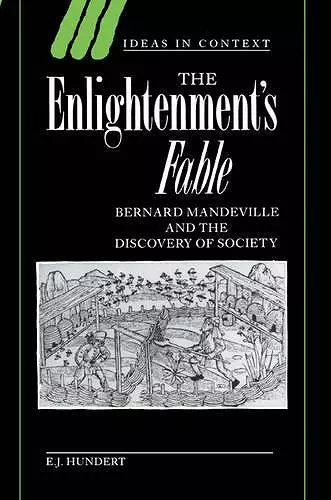The Enlightenment's Fable
Bernard Mandeville and the Discovery of Society
Format:Paperback
Publisher:Cambridge University Press
Published:17th Feb '05
Currently unavailable, and unfortunately no date known when it will be back
This paperback is available in another edition too:
- Hardback£97.99(9780521460828)

Study of influence of Anglo-Dutch Enlightenment theorist, author of infamous maxim 'private vices, public benefits'.
The Enlightenment's 'Fable' examines the challenge offered to traditional morality and social understanding by Bernard Mandeville, whose infamous maxim 'private vices, public benefits' profoundly disturbed his contemporaries, and whose Fable of the Bees influenced Hume, Rousseau, Kant, and Adam Smith.The apprehension of society as an aggregation of self-interested individuals, connected only by bonds of envy, competition, and exploitation, is a dominant modern concern, but one first systematically articulated during the European Enlightenment. The Enlightenment's 'Fable' approaches this problem from the perspective of the challenge offered to inherited traditions of morality and social understanding by the Anglo-Dutch physician, satirist and philosopher, Bernard Mandeville. Mandeville's infamous paradoxical maxim 'private vices, public benefits' profoundly disturbed his contemporaries, while his Fable of the Bees had a decisive influence on David Hume, Jean-Jacques Rousseau, Adam Smith and Immanuel Kant. Professor Hundert examines the sources and strategies of Mandeville's science of human nature and the role of his ideas in shaping eighteenth century economic, social and moral theories.
'Whenever anyone speaks, without bitterness … of man as a belly with two needs and a head with one; when ever anyone sees, seeks and wants to see only hunger, sexual desire, and vanity, as though these were the actual and sole motives of human actions; in brief, whenever anyone speaks 'badly' of man - but does not speak ill of him - the lover of knowledge should listen carefully and with diligence.' Nietzsche, Beyond Good and Evil
'Though words be the signs we have of another's opinions and intentions; yet, because of the equivocation of them is so frequent according to the diversity of contexture, and the company wherewith they go (which the presence of him that speaketh, our sight of his actions and conjecture of his intentions, must help to discharge us of): It must be extremely hard to find out the opinions and meanings of those men that are gone from us long ago, and have left us no other signification thereof but their books; which cannot possibly be undertook without history enough to discover those aforementioned circumstances, and also without great prudence to observe them. Hobbes, Human Nature
ISBN: 9780521619424
Dimensions: 228mm x 150mm x 20mm
Weight: 466g
300 pages